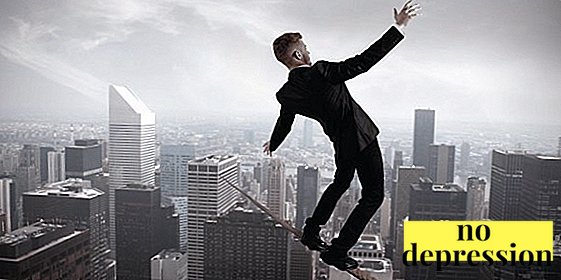The book "The Paradox of the Perfectionist," authored by Tal Ben-Shahar, came to me quite by accident. I usually think that I can cope with all my problems on my own, and often I even convince myself that there are no problems in my life at all. I have almost reached enlightenment, my life is beautiful, I have everything under control, I do not feel negative emotions, and if sometimes it happens that someone gets angry or falls into a despair for a week because some little thing makes me change your plans. After all, I had to figure out the possibility of my sudden illness or the fact that it would rain, snow, a traffic jam would form on the road or break through the heating main pipe and because of this they would block the traffic.
I scolded myself for no reason, arguing to myself that I couldn’t become happier “here and now” because of myself, because for absolute happiness I lack only a little - to control absolutely EVERYTHING and stop experiencing negative emotions AT ALL. Common sense asked me a completely logical question: "Do you know people who have only positive, positive emotions?" to which I replied to myself that if I am not familiar with them, this does not mean that they are not, and even if they are not, what prevents me from becoming the first person without negative emotions. Of course, I considered myself a perfectionist, but I was proud of it, aspired to become an ideal, exemplary perfectionist. How I was wrong!
In the introduction, Tal Ben-Shahar tells three little stories. The first about himself, when he was a student every day he tormented himself with doubts. What happens if he is called to the blackboard and he does not find the answer to the question? What happens if he listens to a word, phrase or a whole lecture? But what if failure awaits him, he will not graduate from the university with distinction, he will not get a job on the robot of his dream, he will not have the life he dreamed of. And now, the worst has come true. He received on the exam four, instead of such a desirable five.
The second story also happened to our author, but ten years later, when Tal Ben-Shahar taught positive psychology at Harvard. He was approached by a young man named Matt, a roommate and fellow student of Steve, who attended his course in positive psychology. Matt told Tal to Ben-Shahar that he was on the alert, because if Matt ever saw his upset, he would tell Steve everything. It was not a joke. This student Matt, just as many were mistaken, believed that a happy life consists only of positive emotions, and there is no place for sadness, envy, jealousy, or disappointment in it.
The third story is about a man named Alandser Claire. His life was perfect. He became the best student at the University of Oxford, then one of his most famous scientists, and was awarded many awards and prizes. He published novels and collections of poems of his own, wrote two albums. But not limited to this, he became a screenwriter, director and producer of the television series about China "Dragon Heart". This series won one of the most significant awards in the cinema - the Emmy Award, but ... Alandser Claire committed suicide at the age of forty-eight, after completing the television series, for which he received an Emmy. His ex-wife said: “Emmy” is a symbol of success, which meant so much to him, thanks to which he would grow in his own eyes. He had so many symbols more meaningful than “Emmy.” Whenever he he did, he needed a new reward. "
These three stories very clearly characterize the main features of the perfectionist: he denies the possibility of failing in something, denies the existence of negative emotions in his life and denies success. Agree, there is something to think about. Yes, and for this special thank you to the author. It is for the opportunity to think, analyze your own fears, mistakes. After another conclusion, the author asks his reader to think. For example, do we recognize ourselves or someone you know in these three stories?
At one time, perfectionism was considered a kind of nervous breakdown. After all, in essence, these are “people whose standards go far beyond the reach of reasonable or reasonable people, who make strenuous and tireless efforts to achieve impossible goals, determine their own value exclusively in terms of productivity and success.” However, science does not stand still, and today's psychologists have identified two types of perfectionism: positive (adaptive and beneficial) and negative (disadaptive and neurotic). The author calls positive perfectionism, optimalism, and negative perfectionism. Throughout the book, the author does not just identify the problem - perfectionism, he gives hope, an alternative in the form of optimalism.
When I started to read, I thought that the author only knows about the problem in theory, yes, he may have spent a lot of time studying the problem, but he does not know what it means to be a perfectionist. And I was pleased to learn that the path he had taken before realizing himself as a perfectionist, and the beginning of the movement towards optimalism, was long and difficult. The author admits that "the theme of perfectionism is closest to my heart and mind, because I myself have encountered his problems. And he adds," I was not surprised that my students in lectures on perfectionism are also of particular interest. As Carl Rogers wrote: "The most personal is the most common."
The book is divided into three parts: theory, practice and reflection. In the first part, the author talks about the importance of making failures, emotions, reality and success. After all, we learn from our mistakes, it is very important to concentrate not on the fact of the error, but on what it can teach us in the future, analyze and draw conclusions. We all want to reach the top and set ambitious goals for ourselves, but we should not become a hostage to our own obligations. To achieve the goal there are always several ways and not always the direct means the best.
No need to go against yourself, against your human nature. Make yourself feel human, do not reject your emotions, whatever they may be. Denying and rejecting negative emotions, we only strengthen their action. After all, the more we try not to get angry, the more we think about what made us angry. Accept reality as it is, with all its sorrows and joys, ups and downs. After all, your friend, colleague, neighbor or relative experience the same fears, the same emotions. If you are sad, allow yourself this, because sadness will bring joy from consolation, your friends or relatives will give you a pleasant surprise to dispel your sadness and joy will fill your heart. If you are praised by the chef or your department is grateful to you for the award, allow yourself to enjoy success, do not take it for granted, rejoice in it.
We are not perfect and it is worth to accept it. We will not have the perfect love story, the perfect look, as if we just left the cover of a magazine. And there is nothing scary or offensive. Because the ideal love story was written by a screenwriter, staged by the director, and played by actors who often have their own personal lives. The models on the cover of a glossy magazine have been thoroughly processed by Photoshop and in everyday life, without makeup we may not even recognize them.
The essence of the second part of the book is to learn how to apply the ideas discussed in the first part. A large role is given to practical exercises.
In the third and final part, the author reflects, conducts a dialogue with the reader and gives a lot of practical advice. It covers such aspects of life as: the role of suffering in our life, the importance of self-love, the price paid by people who hide their emotions, the movement for aging, despite the anti-aging movement and others.
In general, I really liked the book. She helped me to better understand myself, to realize the problem of taking the path of recovery, the path of optimalism. In the process of reading, I discussed some ideas with my friends and many of them were very interested. So I recommend to anyone who has recognized himself even a little.



